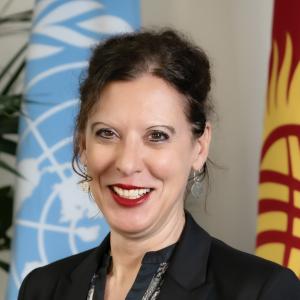Distinguished Minister Mashiev,
Excellencies, development partners, colleagues and friends,
It is my honor to host you for both this dialogue and then the public viewing of the UN Secretary-General’s climate change address which is titled “A Moment of Opportunity: Supercharging the Clean Energy Age.” This very much resonates with Kyrgyzstan’s development priorities and therefore today’s event is very much a part of our collective effort to bring that message home to Kyrgyzstan.
In Kyrgyzstan, we are witnessing growing momentum to harness the country’s vast renewable energy potential and shape a sustainable, inclusive energy future—grounded in climate resilience, regional cooperation, and equitable access.
Kyrgyzstan is well positioned to lead. With vast hydropower potential, promising solar and wind resources, and a population deeply attuned to its natural environment, the country has the building blocks for a clean energy transformation. This is already reflected in the National Development Strategy 2030, recently adopted by the President, which places the green economy at the heart of long-term economic renewal. It was also reaffirmed last week on Friday in New York, where a Kyrgyz delegation, headed by Minister of Economy and Commerce Bakyt Sydykov, presented the country’s second Voluntary National Review at the High-Level Political Forum – a stocktake of SDG progress – highlighting, among others, national progress and priorities under SDG 7, access to affordable, reliable, sustainable, and modern energy. Finally, these priorities are shaping the work underway on the third generation of Nationally Determined Contributions—NDC 3.0, which will guide Kyrgyzstan’s climate and energy commitments ahead of COP30 in Brazil, where all countries have been invited by the UN Secretary-General to present updated plans on their NDCs.
And yet, challenges remain. While nearly all citizens are formally connected to the electricity grid, many communities, especially in mountainous regions, still face frequent supply disruptions, harsh winter energy shortages, and an overreliance on coal and biomass for heating. Recent heatwaves have strained the national grid, driving electricity demand up by more than 25 percent in some areas and exposing the limitations of existing infrastructure. Around 15 percent of households experience some form of energy poverty. The health and environmental costs of outdated heating systems are significant, particularly for children and older persons.
In response—and outlined in the recent Voluntary National Review—the Government has set out a clear vision to transition from fossil fuels to renewables, improve energy efficiency, and expand access to cleaner energy solutions. This includes improving grid access for businesses and households, streamlining connection procedures, and strengthening long-term energy planning. Flagship projects such as the Kambar-Ata-1 hydropower plant and the planned 300 MW solar station in Toru-Aygyr reflect this ambition. New laws on renewable energy and bioethanol have improved the regulatory environment, while cross-border initiatives like CASA-1000 are advancing regional energy integration. Tariff reforms, rural electrification, and a commitment to upgrade more than 1,400 public facilities by 2035 aim to lower consumption, reduce emissions, and improve services—especially in underserved areas.
Under the current Sustainable Development Cooperation Framework 2023–2027, the UN system in Kyrgyzstan is actively supporting ministries and local authorities on clean energy and climate action through two of its four strategic priorities: inclusive green socio-economic development, as well as inclusive approaches to climate action, disaster risk management, and environmental protection. With UNDP’s technical leadership, we are currently assisting in the preparation of NDC 3.0, advancing regulatory reforms such as the Law on Climate Action, and supporting the rollout of the National Adaptation Plan, aligning climate priorities with sustainable development. In parallel, we are promoting clean energy entrepreneurship—including women-led initiatives—introducing energy-efficient technologies in vulnerable communities, and helping to strengthen the Climate Finance Center while mobilizing additional climate finance.
As the Secretary-General will emphasize later, national progress alone cannot carry the energy transition. Greater international cooperation—through concessional finance, technology transfer, and capacity-building from UN agencies, the Green Climate Fund, and multilateral development banks as well as other bilateral partners—remains critical, alongside greater engagement from the private sector to unlock investment and innovation.
Above all, it is essential that a just energy transition benefits the communities. Clean energy investments need to go hand in hand with new jobs, better health, and stronger local economies. Rural areas and vulnerable groups should be actively included in planning and stand to benefit from the results. This requires inclusive decision-making and policies rooted in the everyday realities of citizens. The upcoming NDC 3.0 presents a timely opportunity to align climate, energy, and development strategies into a coherent framework—grounded in evidence and focused on tangible, equitable outcomes.
Let us work together to make this possible. Kyrgyzstan has the potential not only to achieve its very ambitious national clean energy goals, but to lead by example across the region.
Thank you.


